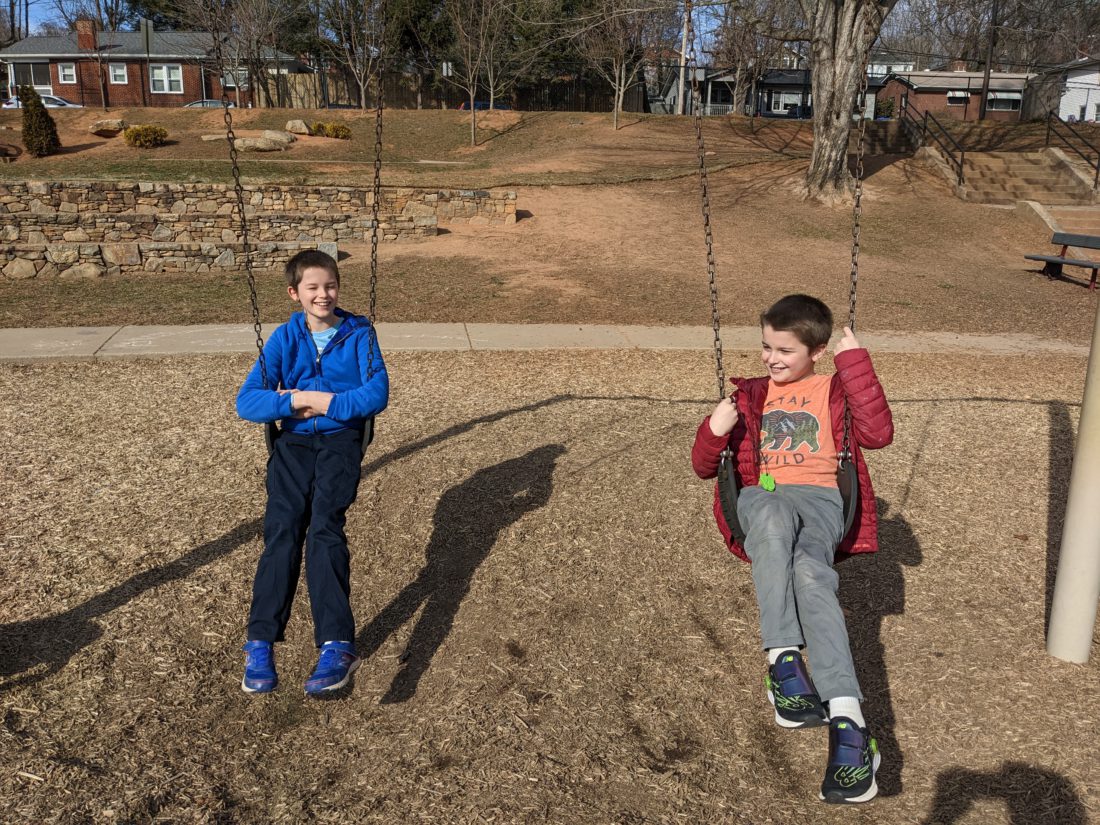Six years ago, Elizabeth Steere and her husband, Ben, received an email from their son Zachary’s private preschool in Jackson County. The email said staff wanted to discuss his progress, a request which Steere thought seemed “perfectly normal.”
At 18 months old, Zach was “unofficially diagnosed” with autism, according to his mother. He received an official diagnosis from a child development specialist at age 3. During his preschool years, Zach had limited verbal ability; he required help with social skills, dressing and hygiene needs.
When the Steeres attended that meeting at Zach’s preschool, the staff “told us they just couldn’t support his needs anymore,” Elizabeth says. “He got kicked out of preschool. … That was just devastating.” And their heartbreak wasn’t only due to Zach’s unmet education needs. “We were in Jackson County for four years, and Zach was never invited to a birthday party,” Elizabeth recalls.
Around this time, the Steeres attended a support group for parents of autistic children. Other parents also had concerns about meeting the special needs of their children’s education. What Elizabeth learned, she says, was that “parents really wanted their kids in Asheville City Schools” because of their resources for autistic children.
When Zach was ready to start kindergarten in 2018, the Steere family moved from Jackson County to Asheville “specifically for Asheville City Schools’ special ed program,” Elizabeth says. Zach is now 9 years old and his brother Alexander is 11 years old. They both currently attend Hall Fletcher Elementary School.
Facts and figures
There isn’t data, beyond anecdotal stories like Elizabeth’s, showing whether or not it’s common for families to move to a new district specifically for its special education services. And the North Carolina Public Schools Statistical Profile — the results of a headcount for the Department of Public Instruction — shows that the number of students with a diagnosis of autism at both ACS and Buncombe County Schools fluctuates slightly each year. However, over the past 17 years, the data indicates an overall increase in the number of students with an autism diagnosis in both school systems.
“It takes resources to serve kids [with autism],” notes David Laxton, spokesperson for an advocacy organization called Autism Society of North Carolina. “It also takes training for the teachers and collaboration with families and other folks that are involved in those students’ lives.”

The goal is to “focus on the needs of each student, because we want them to be the best person they can be and have the most opportunities they can have,” he says.
Kids like Zach are legally entitled to an education through the national Individuals with Disabilities Education Act, which was signed into law in 1975. The IDEA Act mandates that every child with a disability receive “a free appropriate public education.” A FAPE is available for any child with a disability between the ages of 3 and 22.
In accordance with federal law and state policies governing services for children with disabilities, both ACS and BCS offer Exceptional Children services within their schools for children who fall into one of 14 disability categories.
The number of BCS children receiving services for autism in the past 13 years has more than doubled — BCS currently serves 351 such students, according to spokesperson Stacia Harris. To address this rise in special needs students, the district increased its number of autism coaches from two to six and developed a mentorship program for teachers “with the goal of increasing our capacity to serve our autistic students,” Harris writes in an email. Currently, BCS has 16 teachers enrolled in the program.
In 2005, the earliest year data was available, ACS served 43 students with autism as their primary eligibility category for Exceptional Children services, according to the headcount. In the most recent headcount in 2022, the district served 66 such children, according to Sarah Cain, director of exceptional children services at ACS.
Staffing for special education students within ACS hasn’t increased, Cain says. She notes that the district employs instructional assistants, program specialists and a district position for specialized coaching; she declined to share the number of employees but says “we have not seen significant changes in our staff numbers.”
However, ACS currently has a focus group of teachers, administrators and district leaders participating in a specialized training on understanding autism in the classroom. Although it does not have a mentorship program, Cain says, the district is offering scholarships for staff to be trained on autism.
Representatives from both school districts note that the headcount doesn’t accurately represent the full picture of students with autism: Both districts have additional students who do have a diagnosis of autism but don’t require special education and therefore aren’t captured in the headcount.
Different needs
In addition to specialized staff, another way school districts effectively address special needs is with individualized plans. State law spells out the process by which a child becomes eligible for special education. A parent or school staff member makes a referral for the child to be evaluated, and then the child is evaluated by a professional through testing. The results of the test determine whether the child is eligible for special education. (Parents may dispute the determination if eligibility is denied.)
A team of educators and behavioral analysts then works with the parents to develop an individualized educational program, or IEP, for the eligible child. The results of the IEP are reviewed annually, and these services continue until the child graduates, turns 22 or no longer needs the IEP.
Although the process is formalized, IEPs truly are highly individualized. And that, says Laxton from the Autism Society of North Carolina, is crucial to meeting every child’s special education needs. “Autism is an umbrella term for autism spectrum disorder,” he explains. “But you can have very different students under that umbrella.”
As every individual with autism has different strengths and weaknesses, “you can’t assume that what worked for one student is going to work for another student,” Laxton continues. He says variations among people with autism can include being highly verbal, being nonverbal, having high academic skills or requiring greater academic support.
Laxton acknowledges that the failure to address a student’s individual needs can be “confusing” for parents and educators. “It is not a cookie cutter approach, and that’s one of the things that can be challenging,” he explains. “Sometimes what worked in one situation may not work [in another situation].” He also notes that a student’s “needs change over time … Progress can be made or [other needs] might have been identified.”
‘He’s well-loved’
Elizabeth Steere says that in her experience, the development of her son Zach’s IEP at Hall Fletcher has been responsive to his changing needs each year. She notes how “there’s a little bit of a learning curve with his teachers” each year to determine how he best thrives. He’s had an instructional assistant with him in the classroom every year who is employed by ACS and primarily works with him. He spends time with his peers, but also in a separate classroom for exceptional children.
The Steeres chose to have Zach repeat second grade to make up for his disrupted education during the beginning of the COVID-19 pandemic. Zach is in third grade now and he’s a physically active boy. “He’ll do extra PE with the other third grade classes that he’s not in,” his mother explains. “They’ve been doing a hockey unit. Apparently, he’s been batting around the stuffed hedgehog and he thinks it’s the funniest thing ever.”
Elizabeth believes her family made the right decision moving to Asheville. “I’ve been really pleased,” she says. “I know that he’s known at Hall Fletcher and I know that he’s cared for.”
She continues, “He’s doing academics and he also gets movement breaks,” noting that the school has a specially designated ‘movement room’ with trampolines. “And he’s happy and he wants to go to school.”
Zach’s increased happiness and socialization has led to another change, too. “Zach has been invited to birthday parties,” says Elizabeth, laughing joyously. “He’s been to a putt-putt birthday party, he recently went to one at Ninjaville … He’s really well-known. He’s really well-loved.”
Do you have more to add to this story? Contact the author at jwakeman [at] mountainx.com.



Well done, Jessica. We should all be interested in the largest and most vulnerable constituency in Asheville and Buncombe: Citizens with Disabilities (CWDs). CWDs are all genders, races, sexual orientations, and creeds.